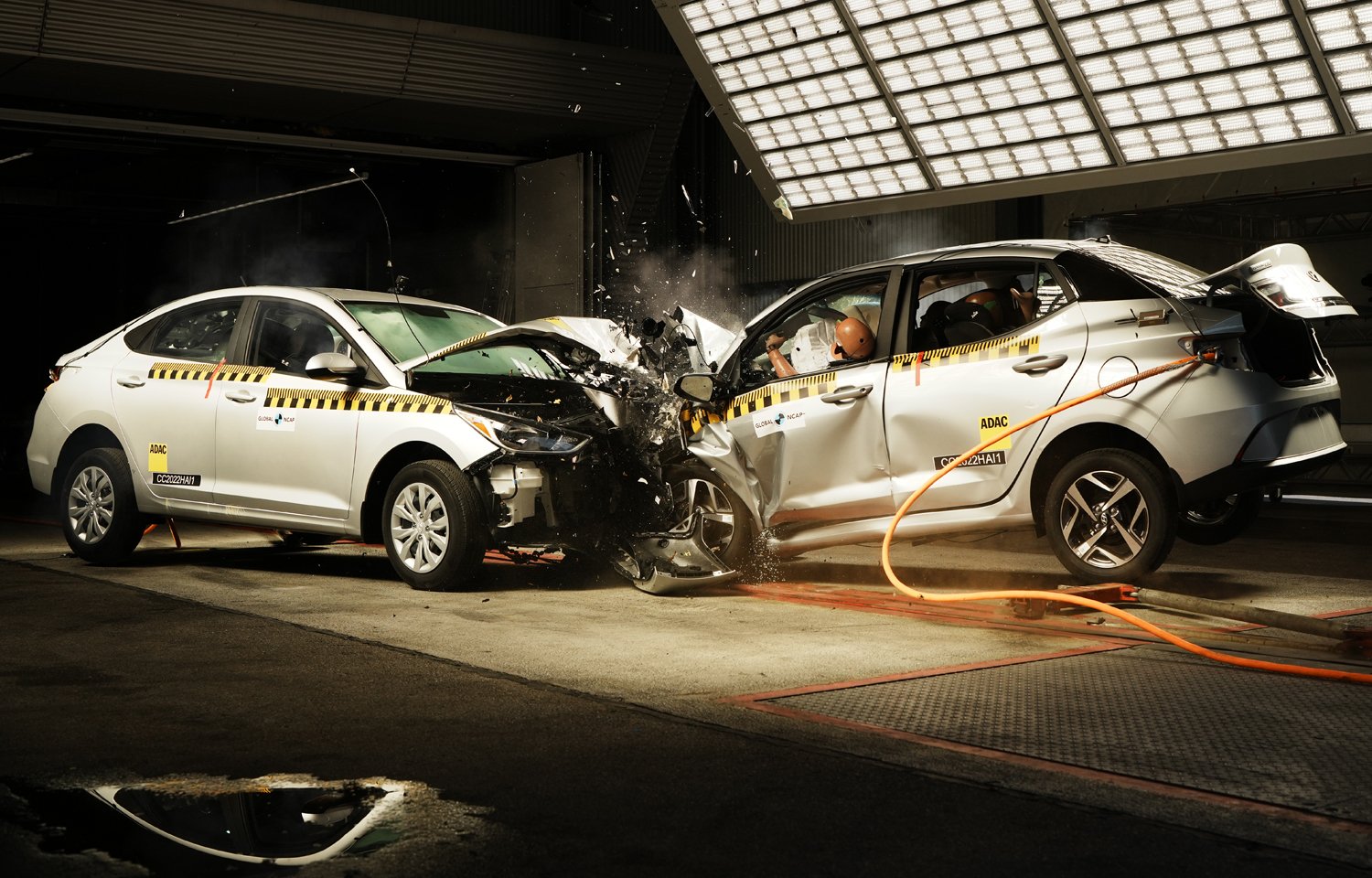Global NCAP’s Car to Car Test Demonstrates Zero Star Double Standard on Vehicle Safety
Launched on the eve of the first UN General Assembly High Level meeting on Road Safety in New York, Global NCAP announces the results of a dramatic car to car crash test today (28th) and demonstrates the double standards that apply to vehicle safety across national borders.
An Hyundai Grand i10 sedan sold in Mexico has been crashed into a comparable Hyundai Accent sold in the US. Both models are the cheapest sedans from the manufacturer that consumers can buy in their respective markets.*
The Hyundai Accent produced for the US market offers 6 airbags and Electronic Stability Control (ESC) as standard. However, the i10 model produced for Mexico and other Latin American markets is fitted with only two frontal airbags.
The protection the Accent offered to its driver during the crash test was good and the model showed a stable structure. The Grand i10 however showed an unstable structure and poor protection to the driver with a high probability of life-threatening injuries. The Hyundai sold in Mexico would be rated as a zero star car by Latin NCAP.
Alejandro Furas, Latin NCAP Secretary General said,
“This test is a wakeup call to consumers, regulators, and car manufacturers. All consumers, no matter where they live, have the right to expect the same standard of safety in their cars. The cross border safety gap should no longer exist. We call for manufacturers to stop the double standard strategies in the world.”
Stephan Brodziak, Latin NCAP Chairman said,
“It hurts to witness once again the terrible double standard with which part of the car industry operates in Latin American and Caribbean countries. This inevitably forces us to think about the suffering that these cars, built under this scheme, end up causing to our families, societies and economies.
In addition, it reveals the great pending task in order to make the Latin American car market mature: the absence of a vehicle safety label. A safety label in all new cars can alert consumers about the risks of low-safety cars and allows the market to move to a commercial logic, turning the car industry, established in our region, into a competition for the safety performance offered that goes beyond the regulatory framework of a country.”
David Ward, Towards Zero Foundation Executive President said,
“It is very disappointing to see such a difference in vehicle safety between Mexico & the USA. A major reason has been relentless lobbying by the Mexican car makers association to delay the application of minimum UN vehicle safety standards. This has happened first for front & side crash tests and electronic stability control and now again for pedestrian protection.
Double standards in vehicle safety are too often the ‘stock-in-trade’ of auto industry associations. And that is why this week’s UN High Level Meeting in New York needs to send a clear message to the auto industry to stop their delaying tactics & apply the most important vehicle safety regulations worldwide.”
Watch the Car-on-Car crash test here: https://youtu.be/2eGpXyAQzuU
Editors note:
*The i10 is manufactured by Hyundai in India and the Accent is made in Mexico.
About Global NCAP
Launched in 2011, Global NCAP is a programme of the UK registered charity the Towards Zero Foundation. Global NCAP serves as a platform for cooperation among NCAPs worldwide, providing financial, technical and advocacy support to new programmes in emerging markets. Global NCAP leads the Stop the Crash Partnership and has consultative status with the UN (ECOSOC), is a member of the UN Road safety Collaboration and an observer at the UN World Forum for Harmonisation of Vehicle Standards. In 2016, Global NCAP received the Premier Prince Michael International Road Safety Award for outstanding achievement in vehicle safety.
For further information, to follow and share:
twitter.com/globalncap
facebook.com/globalncap
instagram.com/globalncap
www.globalncap.org






